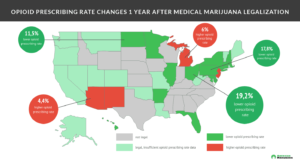
By DJ Rippert
The lesser of two evils. The ongoing 2020 Virginia General Assembly session has generated a lot of debate over gun control. Proponents of stricter firearms regulation cite reduced gun violence as a goal. While gun-related deaths (including murder) are a real problem, those deaths are less frequent than fatal opioid overdoses. In 2017, there were 455 murders in Virginia versus 1,241 drug overdose deaths involving opioids. The number of fatal opioid overdoses in Virginia rose from about 500 in 2010 to over 1,200 in 2018 while the number of gun related deaths (of all types) rose from 868 to 1036 over the same period. While it’s fair to say that Virginia has taken many steps to deal with the opioid crisis there is one step that has not been taken: legalization of medical marijuana. Recent studies point to the fact that most states adopting legal medical marijuana see an immediate reduction in opioid prescriptions after medical marijuana is legally available.
The road to hell … is paved with good intentions. While illegal opioids like heroin have been used and abused in America for years the recent spike in opioid abuse has a legal genesis. In the early 1990s pharmaceutical companies held out a new generation of opioid medicines almost as a panacea for pain relief. It was said that these new medicines would relieve pain without becoming addictive. Based on these assurances, opioids were legally prescribed for a spectrum of relief from significant pain. Once used almost entirely to treat cancer-related pain, by 1999 86% of patients using opioids were using them for non-cancer pain. In some communities opioid prescriptions became the rule, rather than the exception, for pain relief. Two Virginia localities, Norton and Martinsville, topped the list for per capita opioid pain pill distribution from 2006 to 2012. Over those seven years Norton saw a distribution of 306 pills per person while Martinsville checked in at 242. The “average” resident of Norton was taking one pain pill every eight days for seven years. In reality, the distribution was skewed to a subset of the population which was taking pain pills at a much faster rate. People started to overdose. People started to die.
As the problems with opioid prescriptions became obvious the pills were made harder to legally obtain. This caused the second shoe to drop when it became obvious that opioids were, especially for some people, highly addictive. An illegal secondary market for legally prescribed pills started as opioids were transferred from those to whom they were prescribed to others. After that secondary market dried up, the opioid-addicted turned to heroin — an illegal opioid-based drug. Deaths due to heroin-related overdose increased by 286% from 2002 to 2013.
The latest chapter in this tragedy involves illegally manufactured fentanyl, a potent synthetic opioid that is 50 to 100 times stronger than morphine. Fentanyl is sometimes sold on the black market as fentanyl and sometime mixed with heroin or cocaine to increase potency. This mixing is very unscientific and can result in extremely potent doses. Deadly doses. Starting in about 2006, accidental fatal overdoses of illegal fentanyl spiked in the U.S.
Ganja to the rescue? Opioids are still being legally prescribed. The peak prescription rate for prescribed opioids was 81.3 per 100,000 Americans in 2012. By 2017 that number had been cut to 58.7. However, that’s still almost 200 million prescriptions. In some places it’s much worse. Lee County, Va had a per capita prescription rate of 132.6 in 2017 (whereas Fairfax County had 24.9). People still suffer from chronic pain and doctors still prescribe opioids. The search for alternatives has led, in many cases, to medical marijuana. Chronic pain relief is the most common qualifying condition for the prescription of medical marijuana. The online marijuana journal American Marijuana undertook a study of the 19 states that both legalized medical marijuana and had sufficient data to study opioid prescription rates. Fifteen of the 19 states showed a drop in opioid prescribing from one year before medical marijuana was legally available to one year after. Opioid prescriptions in Ohio dropped by almost 20% during the study period.
Implications for Virginia. In 33 states medical marijuana (including THC) is legal. Virginia is one of 17 states where medical marijuana is illegal. The 2020 General Assembly session seems likely to decriminalize marijuana but unlikely to legalize medical marijuana. This delay will have deadly consequences for some number of Virginians who are taking (or will soon start taking) opioids for pain relief under a doctor’s supervision. Over a thousand Virginians die each year from opioid overdoses. Nobody has ever died from a marijuana overdose. But Virginians will not be prescribed medical marijuana instead of opioids because medical marijuana is illegal. Someday Virginia will join the majority of American states by legalizing medical marijuana. Until then, our General Assembly’s dithering on medical marijuana will add to Virginia’s opioid body count in 2020 and beyond.
Finally, some will say that medical marijuana has not gone through the rigorous approval process required by the FDA. Tell that to the families of the thousands of dead Virginians whose loved ones lost their lives in a fatal process that started by taking FDA-approved opioid pain killers. Once again: Nobody has ever died of a marijuana overdose.

Leave a Reply
You must be logged in to post a comment.